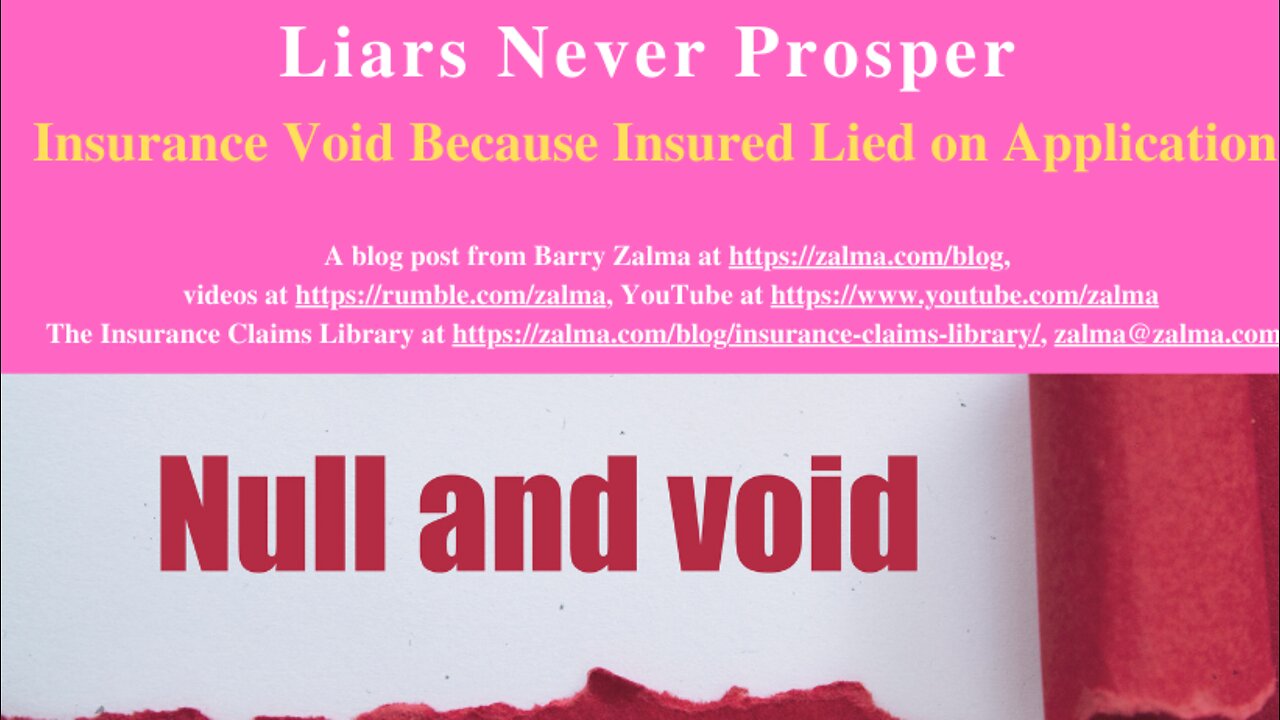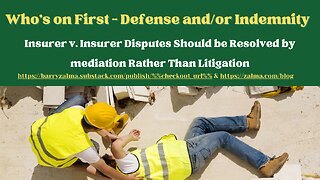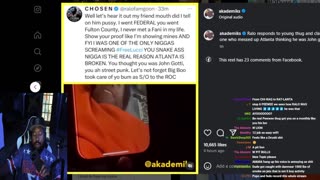Premium Only Content

Liars Never Prosper
Insurance Void Because Insured Lied on Application
As my mother taught me when I was a child: "Liars Never Prosper!" She was more definite than reality although in insurance the maxim about liars must be followed.
In Saul Valdez v. Nationwide Insurance Company Of America, No. 3:20-CV-01196-YY, United States District Court, D. Oregon, Portland Division (September 30, 2022) Saul Valdez sued Nationwide Insurance Company of America alleging a claim for breach of contract, including counts for breach of express contract terms and implied covenant of good faith and fair dealing. Nationwide claimed Valdez obtained the policy by misrepresentation of material facts.
FACTUAL BACKGROUND
Plaintiff called defendant, seeking to add an insurance policy to one of his properties (referred to hereafter as “the property”). Defendant's representative asked plaintiff a series of questions about the property to gather information and gauge eligibility. After plaintiff answered those questions, the representative informed plaintiff that he would “receive at some point over the next six days." Defendant emailed plaintiff an application and insurance binder for his review and signature via DocuSign.
Plaintiff signed the application on May 21, 2020, and defendant mailed plaintiff a physical copy of the policy (sans application). Around that time, and in accordance with the company's underwriting guidelines for newly-insured properties, defendant opened an independent investigation to verify the information plaintiff had provided about the property. A third-party independent investigator visited the property and provided a report to defendant. Before a report was obtained a fire then occurred at the property, resulting in a total loss.
When plaintiff did not receive any adjustments or payments from defendant, he sued. Roughly a month-and-a-half later, on August 25, 2020, defendant issued a letter to plaintiff declaring that the insurance policy for the property was rescinded “back to the 05/15/2020 inception date.” The letter explained that plaintiff “at the time of application, misrepresented, concealed, or omitted multiple points of important (i.e., material) information” and that “[i]f truthful information had been provided, [defendant] would not have accepted the application for multiple underwriting reasons.”
The Parties' Motions
Plaintiff's motion sought summary judgment on all five of defendant's affirmative defenses: (1) policy rescission, (2) breach of policy condition, (3) real party in interest, (4) lack of insurable interest, and (5) failure to state a claim. In its response to plaintiff's motion, defendant stipulated “to the dismissal of its Fourth and Fifth Affirmative Defenses.” Therefore, defendant conceded summary judgment on its fourth and fifth affirmative defenses but demanded rescission based on the other defenses.
Misrepresentation or Concealment Concerning the Insurance
The first element that an insurer must demonstrate to void a fire insurance policy is that the insured either willfully concealed, misrepresented, or falsely swore any fact or circumstance concerning the insurance. Defendant submitted distinct examples where plaintiff's representations on his application differed from the true state of the property.
plaintiff represented on his application that the property was not “currently undergoing extensive remodeling or additions.” The realtor later provided deposition testimony that the property was “being remodeled, for sure.” Plaintiff conceded during his deposition that “the electrical [work] wasn't complete”; there was no finished flooring; no hung sheetrock; no installed countertops or appliances; no bathroom fixtures or toilets; and no insulation or wood paneling in the upstairs sections.
in a similar vein, plaintiff also represented that the property was suitable for occupancy, specifically as a one-family home. But in his deposition, plaintiff's architect, Lawler, opined that he did not believe “an inspector would give a certificate of occupancy for a building in the condition it was in at that time.”
plaintiff claimed on his application that there was no “business on [the] premises” of the property. By his own admission, plaintiff was running his business on the premises of the property, and his representation that there was no “business on [the] premises” was false.
plaintiff denoted on his application that the property was not subject or liable to any additional insured parties or interests. However, the deed on the property was in the name of plaintiff's property management company, Renaissance Properties, LLC.
plaintiff claimed that there was “no prior insurance” on the property. The property was insured for at least the first year after the sale.
Finally, plaintiff indicated on his application that the condition of the dwelling was “[e]xcellent.” Yet both the third-party inspector and plaintiff's architect, Lawler, observed that the windows of the property were boarded up in late May 2020, close in time to when plaintiff submitted his application to defendant. Both individuals also confirmed the presence of graffiti on the property, and the third-party inspector observed that the property contained an “attractive nuisance” of inoperable vehicles, junk appliances, farm equipment, and excessive trash and debris.
Insurance fraud or false swearing is a purely a civil dispute, and accordingly, the measure of proof is by a preponderance of the evidence. In civil cases the word “wilful,” amounts to nothing more than this: "that the person knows what he is doing, intends to do what he is doing, and is a free agent."
On balance, defendant's evidence, which demonstrates blatant misrepresentations surrounding the condition and status of the property, along with plaintiff's silence regarding his state of mind when reviewing and signing the application, overwhelmingly tips the scales in favor of a finding that plaintiff made willful misrepresentations when completing his application.
Application Attached to the Policy
The requirement that the application be attached to the issued policy, in essence, serves as a consumer protection mechanism, ensuring that the insured is aware of the terms of the policy when it is issued. While the text of the binder itself is indeed short, the entire document provided to plaintiff-the binder and application- contains crucial details about the policy that was being contracted for. Thus, plaintiff was provided with “everything that the insurer [relied] on in issuing the policy, i.e., the entire agreement of the parties.” The binder produced to plaintiff meets the definition of a “policy” under O.R.S. § 742.208.
In sum, the binder produced to plaintiff meets the definition of a “policy” under O.R.S. § 742.208, and because plaintiff's application was attached to that binder when it was provided to plaintiff, the second element of the statute is met.
Representations Were Material
It was established that had plaintiff provided accurate answers about the condition of the property, defendant would not have accepted the application for insurance.
Reasonable Reliance on Representations
Lastly, to void a fire insurance policy, an insurer must demonstrate that it relied upon the applicant's material misrepresentations. Defendant proffered evidence sufficient to establish a prima facie case of reliance.
Nationwide established the four elements required under O.R.S. § 742.208 to effectuate a successful voidance of plaintiff's fire insurance policy. Because Nationwide successfully voided the policy, plaintiff's claim for breach of the express terms of that contract falls. Defendant's motion for summary judgment is therefore appropriate for plaintiff's claim alleging an express breach of the contract.
Having found that the policy was successfully voided as to any party, the court need not reach defendant's argument that plaintiff is not the proper party in interest. Nationwide's motion for summary judgment was granted in full.
ZALMA OPINION
Insurance has always been a business of the utmost good faith. An applicant for insurance who lies on an application for insurance about facts that are material to the decision of the insurer to either insure or refuse to insure a person against the risk of loss by fire. In this case the lies on the application were obvious and egregious. Valdez lied to get the insurance and was faced with the effect of the lie showed a serious effort of unmitigated gall by filing suit against Nationwide. The court found six clear misrepresentations of material fact when one would have been sufficient. Valdez should have been sanctioned for bringing a spurious and frivolous lawsuit and reported to prosecutors for the fraud in the inception of the policy and the claim knowing the policy was void.
(c) 2022 Barry Zalma & ClaimSchool, Inc.
Barry Zalma, Esq., CFE, now limits his practice to service as an insurance consultant specializing in insurance coverage, insurance claims handling, insurance bad faith and insurance fraud almost equally for insurers and policyholders. He practiced law in California for more than 44 years as an insurance coverage and claims handling lawyer and more than 54 years in the insurance business. He is available at http://www.zalma.com and zalma@zalma.com.Subscribe and receive videos limited to subscribers of Excellence in Claims Handling at locals.com https://zalmaoninsurance.locals.com/subscribe.Subscribe to Excellence in Claims Handling at https://barryzalma.substack.com/welcome.
Now available Barry Zalma’s newest book, The Tort of Bad Faith, available here. The new book is available as a Kindle book, a paperback or as a hard cover.
Write to Mr. Zalma at zalma@zalma.com; http://www.zalma.com; http://zalma.com/blog; daily articles are published at https://zalma.substack.com. Go to the podcast Zalma On Insurance at https://anchor.fm/barry-zalma; Follow Mr. Zalma on Twitter at https://twitter.com/bzalma; Go to Barry Zalma videos at Rumble.com at https://rumble.com/c/c-262921; Go to Barry Zalma on YouTube- https://www.youtube.com/channel/UCysiZklEtxZsSF9DfC0Expg; Go to the Insurance Claims Library – https://zalma.com/blog/insurance-claims-library
-
 10:17
10:17
Barry Zalma, Inc. on Insurance Law
1 year agoWho's on First - Defense and/or Indemnity
192 -
 22:42
22:42
Liberty Hangout
9 hours agoCollege Democrats Say Gangs Are GOOD!
73.8K68 -
 2:14:50
2:14:50
Badlands Media
14 hours agoBadlands Media Fantasy Football Live Draft
43.2K -
 2:12:29
2:12:29
Inverted World Live
8 hours agoWe Are Time Travelers | Ep. 100
86.1K13 -
 2:57:09
2:57:09
TimcastIRL
8 hours agoCorporate Press Refuses To Mention Minneapolis Shooter Was Trans | Timcast IRL
192K102 -
 5:26:57
5:26:57
Akademiks
8 hours agoWar in RAT-LANTA. Young Thug vs Gunna vs Ralo vs YSL MONDO. Who Will Le Bebe Pick. FINAL CRASHOUT!
60.1K6 -
 1:02:24
1:02:24
Man in America
11 hours agoThe Final Battle: Nanotech, Transhumanism & the War for Your Soul w/ Dr. Ed Group
48.8K6 -
 39:56
39:56
Sarah Westall
6 hours agoUpcoming World Wide Economic Collapse/Deep Recession & What the Big Money is Doing w/ Ed Dowd
46.7K5 -
 2:52:55
2:52:55
Barry Cunningham
7 hours agoIT'S MOVIE NIGHT WITH BARRY!
54K29 -
 31:05
31:05
The Why Files
2 days agoPeru's Most Terrifying Mystery | The Face Peelers
58.7K41